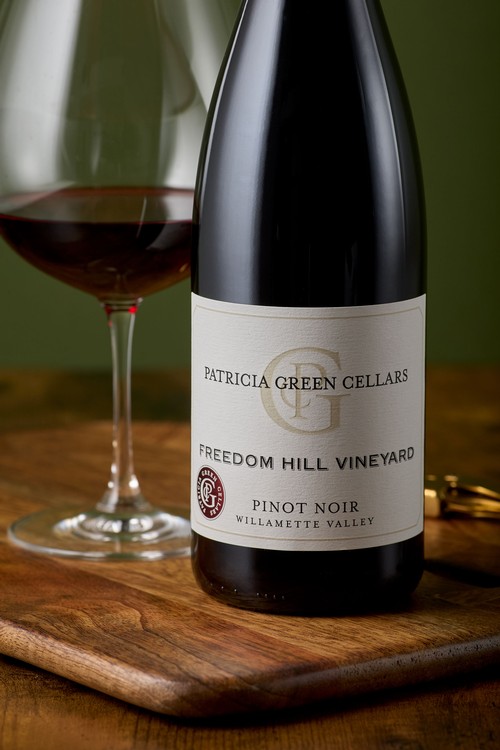2022 Freedom Hill Vineyard Pinot Noir 9L
93 Points

PGC Blocks: This is a bottling largely based on three Dijon 115 blocks (41 of the 60 barrels come from these 3 blocks) but with fruit from other interesting and diverse sources to round it out into a unique and delicious Freedom Hill Classic bottling.
Coury Clone: .85 acres. 2010 planting. California heritage clone with an unusual growing pattern that best suits a four fruiting cane trellising system. Clusters are extremely small, and fruit is very intense.
Dijon 115 Heritage Rows 1-25: 1.35 acres. 2007 planting. Comes in after Dijon 115, 777 and 667 in Oregon so not particularly heavily planted but does well (the Estate Vineyard, Etzel Block bottling is largely Dijon 114) in Oregon mixing heavy fruit with earthy elements.
Dijon 115 Heritage Rows 60-81: 2.69 acres. While a Dijon clone, this is better known and far more widely planted in California than Oregon. Bountiful clone with small clusters and dynamic fruit profile.
Pommard: 1.91 acres (less than half producing). 1978 planting. Interesting and unique clone set into a swale with cooling influences abounding. Extremely short plants and tiny clusters.
Wadensvil East Liberty Block: .2 acres. 2002 planting. A huge mix of at least seven and maybe nine different clones. Selection unknown.
Wadensvil Heritage Block: 2.03 acres. 2006 planting. California heritage clone. Tucked into the highest portion of the vineyard along the eastern tree line. Variable cluster sizes and shapes. Produces well and tends toward highly pigmented and structured wines.
Farming Practices: Since 2013 Freedom Hill Vineyard has been moving diligently and consistently from conventional farming practices to organic farming. While not 100% turned to organic practices it is closer to that than it is too so-called “sustainable farming.” Great attention has been paid to specific cover cropping, foliar feeding, and cultivation. The result is a healthier vineyard with a greater range of blocks producing single vineyard quality style wines.
Picking Dates, Tonnages, Tons/Acre: October 4: Coury 3.84 tons (2.55 tpa), October 14 Wadensvil Heritage Block 5.23 tons (2.67 tons/acre), October 10 Dijon 115 Rows 1-25 9.62 tons (3.19 tpa), October 8: Dijon 115 Rows 60-81 6.87 tons (4.58 tons/acre), October 12 and 14: East Liberty Dijon 115 14.15 tons (4.16 tons/acre), October 14 East Liberty Wadensvil 8.83 tons (4.41 tons/acre).
Vinification: Multiple different approaches:
Destemmed: Heritage Wadensvil (3 fermenters), Dijon 115 Rows 60-81 (4 fermenters), Heritage Coury Clone (2 fermenters), East Liberty Wadensvil (2 fermenters)
40% Whole Cluster: East Liberty Wadensvil (2 fermenters), Heritage Dijon 115 Rows 1-25 (2 fermenters)
100% Whole Cluster: Heritage Dijon 115 Rows 1-25 (2 fermenters), East Liberty Dijon 115 (2 fermenters)
Winemaking: Fermentations were managed by a combination of pumpovers early in the process and exclusively prior to fermentation beginning as well as pigeages to ensure gentle handling, extraction, and delicate tannin construction. Cold soaks were generally 3-4 days with a couple of blocks getting up to between 6-7 days. Full fermentation from beginning to pressing was 16-17 days except for the 100% whole cluster ferments which were between 19-20 days. 24-48 hour settling prior to being racked to barrel. All wines on full lees until assemblage for bottling. Bottled without fining or filtration.
Barrels: This 60-barrel bottling consists of a variety of barrel ages and cooperages. We employed the largest selection of coopers ever at Patricia Green Cellars in 2022 due to having cancelled our spring order from Cadus because of the frost (and thinking there would not be the fruit to justify a barrel order). There are 10 new barrels in this bottling (16-17%) with coopers such as Tonnellerie O, Tonnellerie Sud Ouest, ANA, Billon represented as well as Cadus. Past that there are a small handful of 1-3x used barrels but over 40 of the 60 total barrels are neutral so there is a small amount of barrel influence but just enough to provide some richness to the structured nature of the wine and sweetness to its savory inclinations.
Coury Clone: 2 barrels
Dijon 115 East Liberty: 7 barrels
Dijon 115 Heritage Block Rows 1-25: 20 barrels
Dijon 115 Heritage Block Rows 60-81: 14 barrels
Wadensvil East Liberty Block: 15 barrels
Wadensvil Heritage Block: 2 barrels
Notes: This bottling represents one of our highest QPR wines, each and every vintage. Because we are fully committed to this site, we take more acreage of Pinot Noir than any of the other wineries that pull fruit from here. Because we take a lot by both volume and diversity of blocks and clones and because we choose to bottle some barrels from some of the individual blocks, we can create a larger bottling that is still full of Freedom Hill goodness while coming in at a price atypical of Freedom Hill Vineyard made by any other producer. We are proud to be able to offer a Pinot Noir from one of Oregon’s premier vineyard sites at a price that many entry level, blended Pinot Noirs go for. Freedom Hill is known for dark, elaborately pigmented wines with a wealth of fruit, generous mouthfeel and a dollop of tannins that gives the wine framework and dimension. While not a lightweight this is far from some bruising or sultry wine. This has intense red/black fruits, earthy spices and just a bit of grip. This will be excellent in its youth but will have solid footing and great upside for well over a decade. This finished with a TA of 5.7, a pH of 3.48 and was bottled with under 25 ppm free SO2 and less than 75 ppm total SO2.

